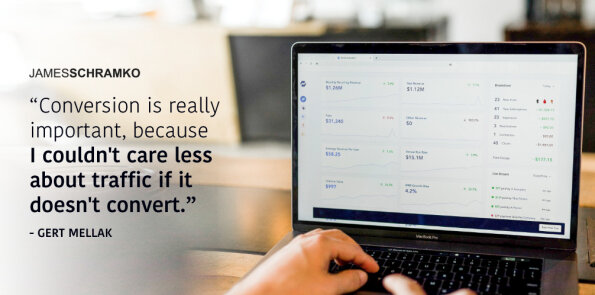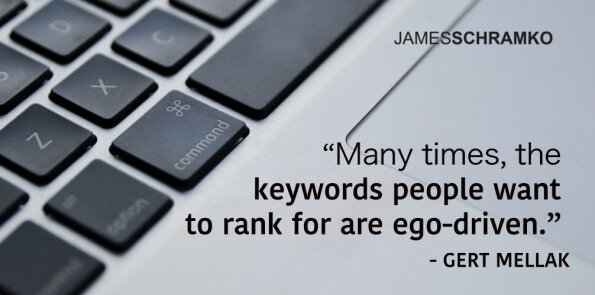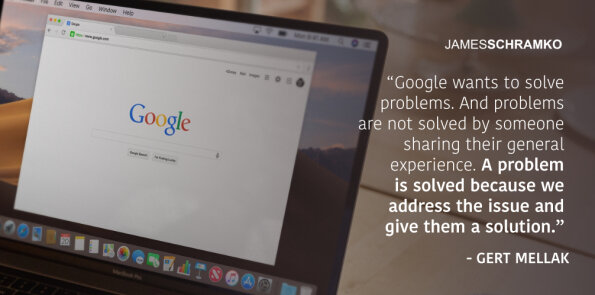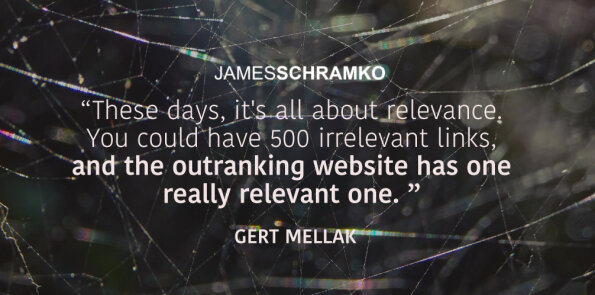No one wants to lose money, especially on something as important as their website’s SEO. However, many business owners and entrepreneurs are doing just that – spending thousands of dollars each month on SEO without seeing any return on investment.
In this post, SEO strategist Gert Mellak shares pointers for minimizing your losses and making sure your SEO spending is actually worth it.
Podcast: Download (Duration: 29:53 — 31.1MB)
Get Notified Of Future Episodes Apple Podcasts | Spotify | Amazon Music | Android | Blubrry | Gaana | TuneIn | Deezer | Anghami | RSS | More
Podcast highlights:
One of the biggest dilemmas in SEO is where to get accurate information. [00:56]
Do you have an SEO provider you can trust? [05:11]
You’ve put in the resources, with no return on investment. What to do? [07:10]
This is why you should be linking internally… [13:07]
Links from outside still carry weight, provided they’re relevant. [17:13]
Do images affect your SEO at all? [21:50]
What kind of relationship do paid and organic traffic have? [24:30]
This episode can be summed up in two pointers… [28:14]
Step up your marketing strategy with help from James
This episode 918 is one of many about SEO. And for that, James has brought back his go-to SEO strategist, SEOLeverage’s Gert Mellak.
One of the biggest problems with SEO
James has been in the online marketing industry for quite some time, and one of the major issues he’s seen around SEO is it’s hard to know where to get sound, accurate information.
There are people in the field who are good at sales and marketing, but less skilled at the technical. Then there are very good technical people who don’t know how to market or sell themselves, and so are something of a secret. They do good work, but you don’t hear about them.
James likes to think Gert has great technical knowhow paired with the ability to communicate the value of what he does. And what he’d like to talk about today is getting the right information and knowing what’s actually effective so our SEO budget doesn’t go to waste.
Absolutely, says Gert. It’s so important. Every day, he talk with clients who have come across what seems like a quick win. Even in an SEO mastermind he’s part of, someone mentioned something that sounded too good to be true. There is no quick fix in SEO, says Gert. And even if there was, it wouldn’t be a quick fix for every single website. You can’t apply something from Shopify, for instance, to a membership website or an online course.
So first of all, you really need to make sure the info comes from a trusted source, and, second, that it is applicable to you in your particular situation.
And of course, says James, the average business owner is dealing with myriad things – who their customers are, what they’re going to offer their customers, which marketing channels they want to use, whether they’re doing paid or organic. They’ve got to hire team; they’ve got to manage where to host their website, how to get the money, staying alive from competitors, continually working on their capacities. They can’t go to a mastermind for everything – they need trusted advisors.
He guesses what Gert is saying is, take every new bit of information with some reservation. You’ll want to validate or verify it somehow, or tap into a source that has a consistent ability to deliver a result over the long term.
Knowing where to go for solutions
So how do we know where to go? James imagines there are SEO tools and SEO forums that publish content, but it’s a lot to take in.
Gert recommends finding someone you trust, and who can guide you and who understands what your SEO objectives are. This is important, so Gert has a couple of calls with new clients, and the first call is only about who they want to reach and how they are going to define a conversion.
 The conversion is really important, because Gert couldn’t care less about traffic if it doesn’t convert. If people on your website don’t check out your products, join your mailing list, reach out to you or do something that you can track as a conversion, then you can check where they come in and optimize.
The conversion is really important, because Gert couldn’t care less about traffic if it doesn’t convert. If people on your website don’t check out your products, join your mailing list, reach out to you or do something that you can track as a conversion, then you can check where they come in and optimize.
You really want to make sure that whoever you trust spends the day with SEO and has an overview of different industries. Because doing SEO in Italy is different from doing SEO in the US or in Australia.
Gert is lucky to have worked with people from all over. He works SEO in three different languages. So he and his team know what is similar, and when to dive in deeper, because Australia and the UK behave differently in search.
Ultimately, once you find someone who knows what you’re trying to achieve, they can then assess whether certain tactics make sense even to try, or can be rolled out completely.
When you’ve invested but not gotten results
What if you’re deep down the path already, asks James? Say you’ve put time and effort and energy into SEO, but are not getting results. What would Gert advise?
They’ve seen this with clients, says Gert, who have done SEO with an agency for a number of years. They’ve just taken over such a project, and turned things around in four months. Because they have a different approach, not to say that they’re much better than everyone else.
It sounds like they’re much better, says James.
Gert thinks they’re much better in identifying what clients want to achieve.
That’s the bottom line, says James. What do you want to achieve? Will Gert tell someone if what they want to achieve is probably not the right thing they should want to achieve?
Yes, says Gert. He has just recently spoken with a client, recommending they test the plan he has before spending on SEO, on getting links, on creating content. The client will now run a Google ads campaign to determine if the keywords they want to rank for will actually convert and bring in the right type of clients.
 Gert has lost clients where he brought them to position one and they didn’t make a sale. He’d rather it not happen again. It’s a really big issue because many times, the keywords people want to rank for are ego-driven.
Gert has lost clients where he brought them to position one and they didn’t make a sale. He’d rather it not happen again. It’s a really big issue because many times, the keywords people want to rank for are ego-driven.
This is where they try to help by defining their customer’s ideal client and ensuring everyone has a full understanding of what they want to achieve.
Are you wasting your money doing this?
Now with all Gert’s experience says James, he would have a general sense of what people are doing that are a complete waste of resource. Can he go through a couple?
The first one, says Gert, is when people spend hours and weeks and months and years writing content, and then come to Gert and say, Look, I have all this content, and it doesn’t rank for anything.
One client had 900 different articles, eight years’ worth of work. Gert asked her to identify what every single article was answering in terms of a possible search. She came back and told him to throw it all away. Why? Because she never took into account that people who search for something need an answer.
 It’s not enough to know you’re the best in your industry and share your knowledge, says Gert. Google wants to solve problems. And problems are not solved by someone sharing their general experience. A problem is solved because we address the issue and give them a solution.
It’s not enough to know you’re the best in your industry and share your knowledge, says Gert. Google wants to solve problems. And problems are not solved by someone sharing their general experience. A problem is solved because we address the issue and give them a solution.
Creating context by relating internal articles
The second biggest mistake Gert sees is that people don’t establish relation between different articles. It’s when someone writes an article that sits isolated on their website, with no connection to the rest of their content. What is the internal links effect on SEO?
The problem with artificial intelligence and machine learning algorithms is that they need a lot of context. A tool, for example, like Jarvis, that creates content with an AI engine, asks for a lot of things to produce the first piece of text. And when they run out of context, you need to continue writing a sentence or two, so they know where it’s going to go. Then the AI can go in again.
Imagine Google, then, seeing an article without any context whatsoever. It can grasp the main concepts, but it doesn’t really know a relation.
What we try to do, then, is that we bring articles in context with each other. If there is an article about email marketing, and you link this to an article about subject lines, Google can understand that email marketing and subject lines are two concepts that are related to each other. Suddenly, Google can find variations where people search for email marketing subject lines, and can rank this email marketing article.
The same article can start ranking for tons and tons of keywords. And then you have a lot of data to work with for the ongoing optimization.
James supposes, over time, if you had related articles, you would have opportunities to then link between them. For example, this post would likely link back to our SEO series with Gert.
If you’ve got nothing to internally link to, you may not have related articles or enough context. Are these things interrelated?
Absolutely, says Gert. The internal linking structure is one of the main things they work with their clients on, on every single project.
“When pages don’t do well, very often their importance is lower.”
Now, they talked about this article about the SEO series. Google can understand there is a relation, and that this SEO series being linked to from multiple different pages is an important article. In their app, Gert calls this page importance. They calculate the page importance of individual pages. And very often, you’ll find that when pages don’t do well, their importance is lower. What that means for Google is, not even the website itself thinks this article is important, why should I rank it?
The authority of external links
Now, they have to talk about backlinks benefits, says James. Say 10 different websites point back to this discussion as a good source of SEO information – that would be a vote for the article, and might help it outrank some other post. Is it that simple?
 It used to be, says Gert. Back in the day, say 15 years ago, people would ask him for 500 links to their website, so they could outrank competitors with less links. These days, it’s all about relevance. You could have 500 irrelevant links, and the outranking website has one really relevant one. So you want those links, you want other people endorsing you in a certain context, referring to you as an authority, but you want them to be relevant.
It used to be, says Gert. Back in the day, say 15 years ago, people would ask him for 500 links to their website, so they could outrank competitors with less links. These days, it’s all about relevance. You could have 500 irrelevant links, and the outranking website has one really relevant one. So you want those links, you want other people endorsing you in a certain context, referring to you as an authority, but you want them to be relevant.
So there’s no point getting all site-wide footer links from a pool servicing forum for your SEO business, says James. And a link from Harvard would be worth more than a link from a local grocery store, for example.
Depends on the project, says Gert. The local grocery store can be very relevant if you’re a local car repair shop.
So hyper-local relevancy would help a local business, says James.
“External links really matter. Just make sure they’re relevant.”
Absolutely, Gert says. External links just really matter. Just make sure that they’re relevant.
What about page layout? James remembers it made a difference where you put links, and he wonders what best practices are these days.
“Reverse engineer what works, essentially, and apply the patterns you can identify.”
Content layout is one of the most important analysis points, Gert replies. And this is something that changes a lot over the years. One client of theirs came in with a big traffic drop. All they did to fix it was rearrange how they presented every site, trying to push the relevant content to the top. So reverse engineer what works, essentially, and apply the patterns you can identify.
Where images factor into SEO
So how about images, James asks? Do proper naming and alternative text still help?
They’re not so big on images, to be honest, says Gert, because very often the CMS you use night change the name. It depends on what you’re using.
James and his team always used to manually change the names. On his surfboard site, they get lots of search volume for products, especially the image search, so it seems to work pretty well.
Gert thinks it depends on the industry you’re in. If you’re in B2B, you probably can put less emphasis on the image search. Google embeds images, embeds videos. Google gets its context, again, in this case, from the image, alternative text and the names, and the surrounding text. So if you’re in an industry where image search is big, you want to pay special attention to these kinds of things. Especially e-commerce, for example.
How organic traffic plays with paid
James wants Gert to speak to the relationship between organic versus paid, because most business owners will have or should have some combination of this.
Paid is a very important channel, says Gert. He thinks every business doing digital marketing should have a paid advertising channel and leverage it to the best of their possibilities. But ultimately, you’ll be depending on high advertising costs.
So they get a lot of people who have a paid channel that works really well, but they’d like to lower the average cost per sale, the average cost per lead, by adding an organic traffic pillar that actually works. And it shouldn’t be just ticking a few boxes on a plugin, Gert says. They really want the strategy behind it. They are in for the long run, and they want to know that if something happens to their ad account, people are still going to find them for their product.
Two pointers for effective SEO
In just two sentences, if you’re spending money on SEO, what would be the guiding philosophies, asks James? He wants two points.
Create content with an intent to serve the search user, says Gert. That’s one. And two is, be consistently executing the right things over time.
And how do we know what the right things are all the time?
With a trusted partner, Gert says. You really want to have someone who you trust and who has, like, some sort of proven framework or system that works and keeps the momentum going. Not everything is going to be an upward trend, there are going to be drops. But you want someone who has a system in place to get those things back on track.
That’s where someone like Gert comes in. If you’re wasting money with your SEO, look for Gert at SEOLeverage.com, and ask his team to review your campaign.
Join the thriving entrepreneurs inside the James Schramko membership
Enjoyed the show? Leave us a review on iTunes









Leave a Reply